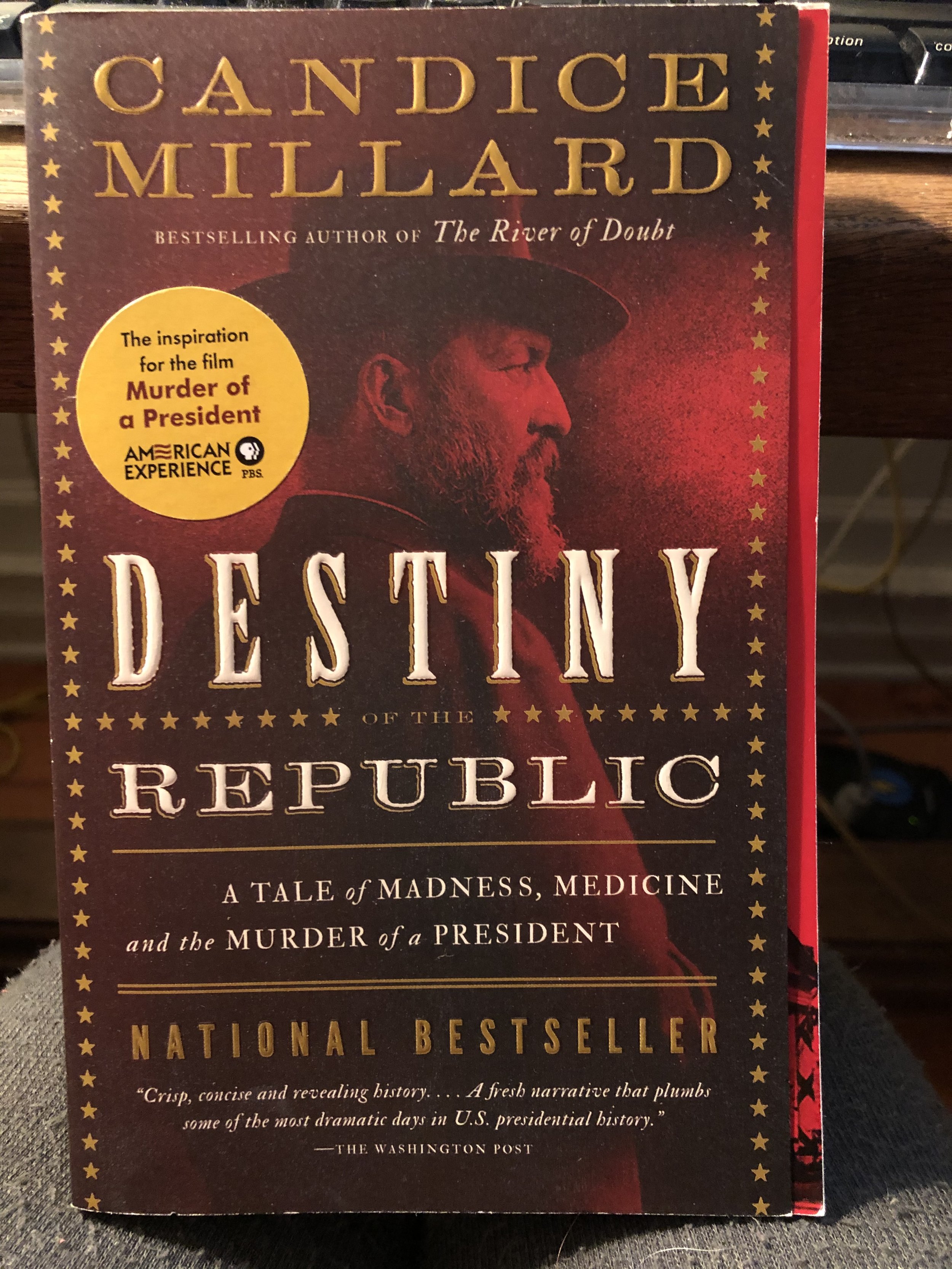History Matters
When Dwight D. Eisenhower was President of the United States and I was in the fourth grade, I memorized and could recite the names in full of every U.S. President. I learned brief facts in my classroom history books about the great ones and less about those who came and went from office having achieved little worth noting. I’d recite—
“There was Washington, Adams, Jefferson, Madison…Monroe, Quincy Adams, Jackson, Van Buren…Harrison, Tyler, Polk, and Taylor…Fillmore, Pierce, Buchanan, and Lincoln…Johnson, Grant, Hayes, and then…For only 200 days, there was James A Garfield (1881).”
But who was Garfield? Sixteen years after Abraham Lincoln was assassinated at the end of the Civil War, President James A. Garfield was shot in the back --just four months after taking office. He lingered for the next 79 days before dying at the age of 49 of blood poisoning and infections caused by the archaic, unsanitary and questionable medical practices of his doctor. When he died, his funeral was attended by more people than had gathered for Abraham Lincoln’s funeral.
As a student, I’d never learned the story of this gifted President’s early life or how he came to be elected to the highest office in the land. I’ve since watched the PBS American Experience documentary “Murder of a President” that aired February 2, 2016. The documentary was based on the historical novel Destiny of the Republic: A Tale of Madness, Medicine & the Murder of a President by historian Candice Millard—an author and former writer/editor for National Geographic. The title alone was reason enough for me to want to fill in the historical backstory missing in my knowledge of Garfield—the man and his dreams for the United States.
Born in a rural Ohio log cabin in 1831 and losing his father as an infant, Garfield worked his way up from hardscrabble poverty with the support of by a mother who encouraged his efforts to get an education. He not only excelled in academics—learning both Latin and Greek—he became a professor of classics and administrator of the Western Reserve Eclectic Institute.
A gifted orator who spoke publicly in support of abolition and the Republican Party, Garfield became a lawyer, and served in the Ohio State Senate. During the Civil War, he rose to the rank of brigadier general in the Union Army. After resuming his political career, he won a seat in Congress and in 1880, though he never sought the nomination, was elected President of the United States.
Garfield who was committed to the cause of civil rights recommended a universal education system funded by the federal government—part of his plan to empower Black Americans. His senseless assassination by a mentally unstable man named Charles Guiteau was but one part of a tragic tale. Garfield’s doctor dismissed the use of antisepsis recently discovered by British surgeon Joseph Lister, ignored basic sanitary measures, and interfered with young Alexander Graham Bell’s efforts to locate the bullet in Garfield’s back with a metal detector that Bell invented in hopes of saving the ailing President.
In 2016 historian Heather Cox Richardson wrote “Garfield had come to represent that vision for which the Union had fought…. He believed that everybody should have equality of opportunity and that the Government should help them get that. With the assassination of Garfield, that vision died.”
Why is Garfield and his tragic death significant today? In her March 29, 2021 blog “Letters from an American,” Richardson explained the long history of voter suppression in America since the Civil War, beginning with what Republicans under Lincoln set in motion that gave Black Americans a say in society. The Military Reconstruction Act of 1867 permitted Black men in the South to vote for delegates to write new state constitutions—constitutions that confirmed the right of Black men to vote.
However, most former Confederates wanted no part of this new system. What followed was the organization of the Ku Klux Klan to suppress voting by Black men. When that didn’t work, Richardson pointed out, “there were efforts to make sure Black people could not vote by requiring educational tests, poll taxes, or a grandfather who had voted, effectively getting rid of Black voting.”
Richardson concluded, “Today Republicans talk about ‘election integrity,’ but their end game is the same as that of the former Confederates after the war: to keep Black and Brown Americans away from the polls.”
Had Garfield lived to champion the dream for which the Union fought, voter suppression in America might not be still dominating politics in former Confederate states like Georgia today. Had Kamala Harris been elected president on November 5, 2024, her vision like Garfield’s—that every American should have equality of opportunity and the Government should help them get it might—might not have once again been deferred.
Richardson’s gift as a historian is her ability to connect events from American history with what is happening in our divided country today. May her steadfast voice of reason continue to shine light on truth whenever our democracy and rights come under siege. History matters.
[February 01, 2024, Netflix announced that Destiny of the Republic, Millard’s 2011 tale of President James Garfield and his 1881 assassination, will come to TV as a series called Death by Lightning starring Michael Shannon as Garfield and Matthew Macfadyen as his assassin, Charles Guiteau.]





